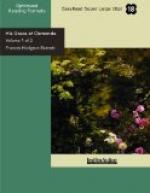“’Tis a strange thing,” he said to himself, “how I seem forbid by Fate to avoid the path of this strange wild creature. My Lord Marlborough brings her up to me at his quarters, I leave them; and going to my own, meet with Tantillion and his letter; I enter a coffee-house and hear wild talk of her; I go to my own house and my mother paints a picture of her which stirs my very depths; I walk in the streets of London and am dragged aside to find myself gazing at her portrait; I leave it, and meet my Lord Dunstanwolde, who prays me to go to Warwickshire, where I shall be within a few miles of her and may encounter her any hour. What will come next?”
That which came next was not unlike what had gone before. On their journey to Warwickshire my Lord Dunstanwolde did not speak of the lovely hoyden, whereat Roxholm somewhat wondered, as his lordship had but lately left her neighbourhood and her doings seemed the county’s scandal; but ’tis true that on their journey he conversed little and seemed full of thought.
“Do not think me dull, Gerald,” he said; “’tis only that of late I have begun to feel that I am an older man than I thought—perhaps too old to be a fit companion for youth. An old fellow should not give way to fancies. I—I have been giving way.”
“Nay, nay, my dear lord,” said Roxholm with warm feeling, “’tis to fancy you should give way—and ‘tis such as you who are youths’ best companions, since you bring to those of fewer years ripeness which is not age, maturity which is not decay. What man is there of twenty-eight with whom I could ride to the country with such pleasure as I feel to-day. You have lived too much alone of late. ’Tis well I came to Warwickshire.”
This same evening after they had reached their journey’s end, on descending to the saloon before dinner, his guest found my lord standing before the portrait of his lost wife and gazing at it with a strange tender intentness, his hands behind his back. He turned at Roxholm’s entrance, and there were shadows in his eyes.
“Such an one as she,” he said, “would forgive a man—even if he seemed false—and would understand. But none could be false to her—or forget.” And so speaking walked away, the portrait seeming to follow him with its young flower-blue eyes.
’Twas the same evening Lord Twemlow rode over from his estate to spend the night with them, and they were no sooner left with their wine than he broke forth into confidence and fretting.
“I wanted to talk to thee, Edward,” he said to Dunstanwolde (they had been boys together). “I am so crossed these days that I can scarce bear my own company. ’Tis that young jade again, and I would invent some measures to be taken.”
“Ay, ’tis she again, I swear,” had passed through Roxholm’s mind as he looked at his wineglass, and that instant his lordship turned on him almost testily to explain.
“I speak of a kinswoman who is the bane and disgrace of my life, as she would be the bane and disgrace of any gentleman who was of her family,” he said. “A pretty fool and baby who was my cousin married a reprobate, Jeof Wildairs, and this is his daughter and is a shameless baggage. Egad! you must have seen her on the hunting-field when you were with us—riding in coat and breeches and with her mane of hair looped under her hat.”




